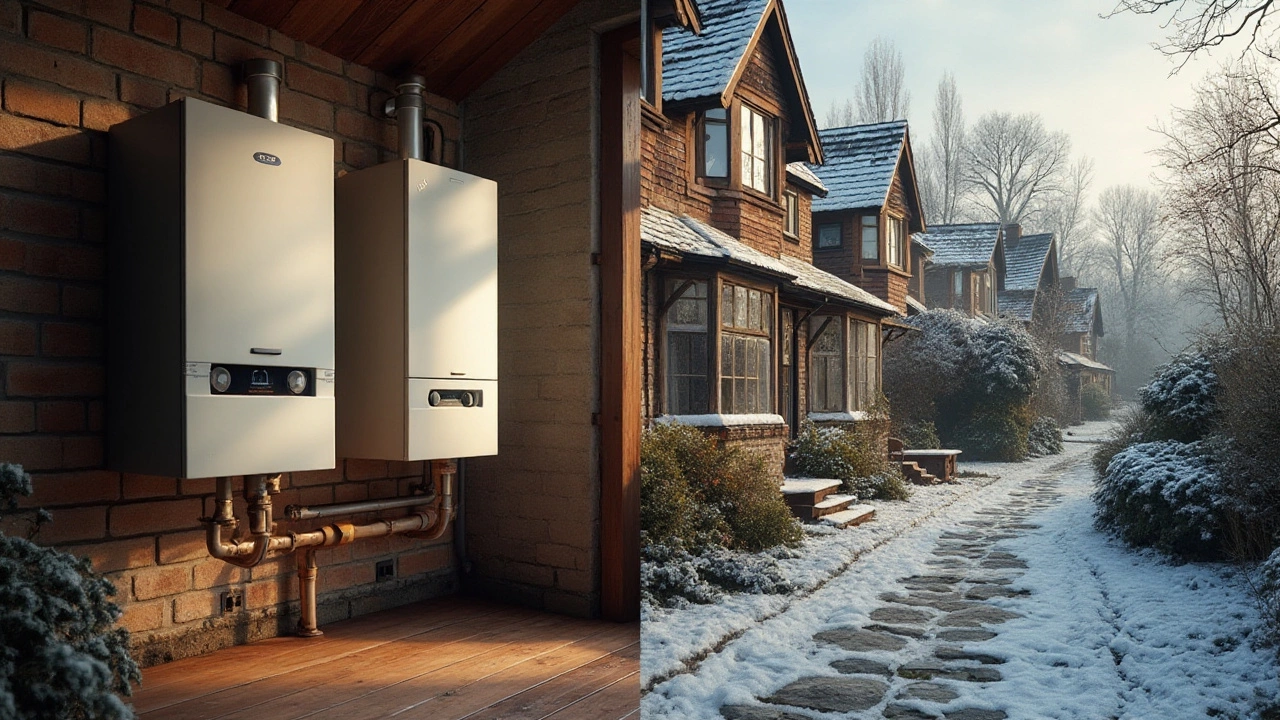In the chill of winter, there's nothing worse than a heating system that fails when you need it most. Your boiler, a steadfast workhorse, is at the center of keeping your home warm and comfortable. But, like any home appliance, it can falter with time.
Deciding whether to repair or replace a faulty boiler is a dilemma many face. The decision isn't merely about cost; it's about longevity, efficiency, and safety too. With careful consideration, you can choose the best course of action to ensure a cozy home without undue stress on your wallet.
- Signs Your Boiler Needs Repair
- Cost Analysis: Repair vs Replacement
- Factors Influencing Repair Decisions
- The Lifespan of Your Boiler
- Energy Efficiency Considerations
- Professional Repair Services
Signs Your Boiler Needs Repair
Your boiler is a silent worker, often tucked away in utility rooms or basements, quietly ensuring your home remains a sanctuary of warmth during those nippy months. But even the sturdiest of machines have their grumbles, and your boiler is no exception. Knowing the signs of wear and tear can save you not just pocketfuls of money but also keep peace with the comfort of your home. You might find your boiler acting up in different ways which could mean it needs your attention. One classic sign is when your radiators take forever to heat up or don't heat up at all. This might indicate an issue with the thermostat or a problem with water circulation.
Noises can also tell tales. An unusual clunk or whistle isn't your boiler composing a symphony; it’s crying out for help. Banging, whistling, or gurgling sounds often signal kettling, which happens when lime scale accumulates on the heat exchanger, causing water to boil inconsistently. It’s much like the sound of a kettle when the water doesn't boil evenly. Speaking of sounds, a pilot light that keeps going out or has turned yellow instead of blue could indicate blockages or even issues with ventilation that need immediate fixing.
And then there’s the issue of leaks. A water puddle forming around your boiler is not your boiler trying to simulate a quaint outdoor fountain - it’s a serious signal of structural issues inside the system. Leaks often mean there's a failure in one of the pump seals or pressure valve, both of which need urgent boiler repair. Ignoring these issues can lead to more damage over time, increasing your repair costs exponentially. The age of your boiler might also be a harbinger of its condition. Most boilers last between ten to fifteen years. If yours is inching close to or past either marker, frequent repairs might be pointing towards the need for a replacement.
“Regular maintenance and early detection of issues can extend the lifespan of your boiler significantly while keeping energy costs under control” - Consumer Energy Center
Lastly, if you find your heating bills inexplicably rising, your boiler might be at the heart of this mystery. Older or malfunctioning systems often work harder to reach desired temperatures, gulping down more energy than required. Such inefficiency can be remedied with thorough inspections that unearth underlying issues such as outdated components or energy-zapping leaks. Understanding these signs, recognizing when your boiler seems under the weather, and addressing the issues early can mean the difference between a manageable repair and an untimely replacement.
Cost Analysis: Repair vs Replacement
Deciding whether to repair your aging boiler or opt for a replacement can be likened to a fork in the road—each path has its own challenges and rewards. A significant factor in making such a choice is cost, both immediate and long-term. On the one hand, repairing your boiler is often a less expensive option in terms of upfront expenditure. For many, a typical boiler repair might range from $150 to $500, depending on the severity of the problem. This might appear economical, especially if the issue is minor or the boiler is relatively new.
On the flip side, consider the spectrum of expenses associated with frequent repairs. Compounding repair costs, even when each seems minor, can add up over time, potentially surpassing the expense of a new boiler. New boilers range in cost from about $2,500 to $7,500 installed, depending on the model and complexity of installation. The trick lies in knowing when a repair is a short-term fix and when a replacement is a long-term solution. As the adage goes, 'A stitch in time saves nine.' Moreover, constantly dealing with repairs disrupts peace of mind, particularly when the unpredictable burden of a cold snap looms.
"It’s not just about the financial cost—think of the potential energy savings," says Jeffrey Mathews, a seasoned HVAC expert with over two decades of experience under his belt. "A new, energy-efficient unit could reduce your heating bills up to 30% or more annually."
Another angle to consider is the hidden cost of operational inefficiency. Older boilers tend to consume more fuel to produce the same amount of heat compared to their more efficient modern counterparts. This means that even if repairs keep a boiler running, you might still be losing money through inefficiencies. It isn't just about repairing what’s broken but acknowledging when technology has outpaced the efficiency of the systems we're trying to patch.
Potential savings from an energy-efficient replacement shouldn't be underestimated. Installing a modern boiler can lead to significant energy savings, which, over time, contributes to recouping part of the investment. Energy efficiency scores on new models provide an indicator of this potential, often marked by Energy Star ratings which you can use to gauge long-term savings. A diligent review of past energy bills versus projections for a new system paints a clearer picture of potential savings. For example, a 30% reduction in heating costs could mean substantial savings annually, especially in larger homes or those requiring consistent heating.
Undoubtedly, the decision between repair and replacement isn't purely financial. It encapsulates peace of mind, safety, and efficiency. Weighing initial costs against long-term benefits helps in making a decision that balances today’s budget with future savings. Consulting with professionals can assist homeowners to demystify conflicting information and highlight what option aligns best with their unique circumstances. As each boiler and home environment is different, personalized advice is invaluable.

Factors Influencing Repair Decisions
When faced with a malfunctioning boiler, choosing whether to repair it involves evaluating several critical factors. One primary consideration is the age of the boiler. On average, boilers have a lifespan of 10-15 years. If yours falls within this range and frequently requires repairs, it might be inching closer to its retirement. In contrast, a relatively young boiler that's showing issues could often benefit from a repair. The decision pivots around understanding whether investing in repair extends its overall usability effectively.
Another essential element is the availability of parts. As boilers age, finding parts can become increasingly challenging. Scarce parts might not only mean longer wait times for repairs but also steeper prices. In some cases, parts are no longer manufactured, forcing homeowners to opt for replacement by default. For newer models, parts are generally in good supply, making repair a more feasible and cost-effective solution.
Cost-Efficiency Analysis
Delving deeper into costs, it's vital to weigh the repair expenses against a potential replacement. With rising energy prices, modern boilers often prove to be more energy-efficient, translating to lower monthly bills. A boiler consuming more fuel due to inefficiencies might cumulatively cost you more than a new efficient model over time. Conducting a comprehensive cost analysis helps in determining whether the immediate repair charges are justified.
Additionally, the frequency of breakdowns should factor into your decision-making process. If you anticipate repeated visits from the repairman each winter, it's perhaps wiser to invest in a new unit. The peace of mind that comes with reliability shouldn't be underestimated, especially during the cold months where home comfort is non-negotiable. While some may shy away from the upfront costs of replacement, many find relief in ending the cycle of constant repair headaches.
"When you're frequently calling for repairs, it's essential to ask yourself if continuing down that path is economical. Often, looking at replacement from a long-term perspective reveals hidden savings," says energy efficiency expert Jane Sullivan.
The environmental impact of your decision also can't be overlooked. Newer boilers are designed with sustainability in mind, reducing carbon footprints significantly. If contributing positively to the environment aligns with your values, replacing an older, less efficient boiler may be your best option, despite repair options being available.
Some homeowners might also be influenced by available warranties. A repair conducted under a warranty can alleviate upfront costs. However, if the warranty doesn't cover frequent common issues, a closer look at potential replacement benefits is warranted. A well-timed review of warranties can be pivotal in guiding your choice.
The Lifespan of Your Boiler
Your boiler is a critical component of your home’s heating system, and understanding its lifespan is key to maintaining a warm and efficient household. Typically, a boiler can last between 10 to 15 years, but this depends on several factors including the type of boiler, how well it has been maintained, and the quality of the installation initially performed. Regular maintenance and prompt repairs play a significant role in extending its life, helping your equipment stay efficient and safe for many years.
There are various types of boilers, such as combination, system, and conventional boilers, each with their own life expectancies. Combination boilers, often found in smaller homes due to their compact size, may not last as long as a traditional system or conventional boilers, primarily because they work harder to provide both heating and hot water. However, their efficiency makes them a popular choice for modern households wanting to maximize space without losing performance.
Maintenance is crucial for longevity. Regular servicing helps identify potential issues before they evolve into larger problems requiring costly repairs. A common recommendation from many experts is an annual check-up to ensure all components are working optimally. This not only extends the life of your boiler but also increases energy efficiency, which can significantly cut down on utility bills. It's a practice that many homeowners find beneficial, especially during demanding cold seasons.
"A well-maintained boiler runs about 10% more efficiently than one that’s been neglected," notes Paul Ferris, a veteran in home heating mechanics.
In addition to maintenance, the initial installation quality has a notable impact on how long a boiler will operate effectively. Proper installation by a certified professional ensures that all connections and components are correctly configured, minimizing the risk of operational issues down the line. If an installation is poorly done, even the best boilers can underperform, leading to a shortened functional span and frequent breakdowns, pushing you toward repairs more often than desired.
For those looking to plan long-term, it’s worth considering boiler models that come with extended warranties. These warranties often cover parts and labor for a certain number of years, offering peace of mind and financial protection. When choosing a boiler, look for trusted brands recognized for durability and excellent after-sale service. A well-selected model with a robust warranty can endure past the 15-year mark, provided it receives adequate care through the years.
Another angle to consider is technological advancements in boiler manufacturing. Modern boilers are designed for improved efficiency and reduced emissions, often achieving performance that was unattainable with older models. This means that as a boiler ages, it gradually becomes less efficient compared to newer alternatives, even if it's meticulously maintained. Thus, evaluating the operational efficiency of your aging boiler against new models can be a deciding factor for replacement or repair decisions. Understanding the nuanced life cycle of your boiler helps you make informed choices that blend economic sense with practical needs, maintaining comfort without unnecessary expense.

Energy Efficiency Considerations
When it comes to deciding whether to repair or replace your boiler, energy efficiency should be a key factor in your decision-making process. If your boiler is an older model, it might be guzzling more energy than necessary to provide adequate heat, impacting not only your utility bills but also the environment. Modern boilers are engineered to be far more efficient, utilizing advanced technology to extract the maximum heat from the fuel they consume. This means that while a new boiler might present an immediate financial outlay, the savings on your electric or gas bills could offset the cost over time.
Let's delve deeper into how boiler efficiency is measured. Boiler efficiency is typically indicated by its Annual Fuel Utilization Efficiency (AFUE) rating, a measure of how well the unit converts the energy in its fuel to warm air over the course of a typical year. Many older boilers can have AFUE ratings as low as 50-70%, meaning they turn only half to two-thirds of their fuel into heat. Compare this with boilers manufactured after 1992, which must achieve at least 78% energy efficiency thanks to stricter standards.
Energy efficiency isn't just about being kind to your wallet and the planet; it can also affect the overall comfort and health of your home. Efficient boilers tend to provide consistent heat without the large swings in temperature that can occur with less efficient units. Old boilers might also pose a safety hazard if they leak carbon monoxide into your home, a risk mitigated by modern, more efficient systems.
"Upgrading to a new heating system can save homeowners 20-percent or more on their annual energy heating costs," says Alex Hegwell from the Energy Saving Alliance.As concerns around sustainability and environmental impact grow, many areas now offer financial incentives for those who choose to upgrade to more efficient systems. It’s worth exploring whether any such programs or rebates are available in your locality, which can help to further defray the cost of a new installation.
Additionally, consider how frequently you find yourself calling in for boiler repair work. If parts are failing more often or you’re noticing dips in performance, could these be signs your current system might not be living up to its potential? Repairs can only go so far to patch up systemic inefficiencies. If your unit is nearing the end of its life expectancy — typically around 10-15 years for a traditional boiler — a new energy-efficient model could be the more cost-effective choice in the long run, when taking into account repair costs and monthly energy savings.
Professional Repair Services
When your boiler starts to act up, the inclination to fix it yourself can be tempting. But the value of professional repair services cannot be overstated. Hiring a skilled technician ensures that the repair is not only correctly done but also enhances the lifespan of your heating system. These professionals possess the experience and know-how required to diagnose and fix issues that might seem innocuous but could escalate into major problems over time.
A professional repair service will conduct a thorough assessment of your boiler, uncovering underlying issues that may not be immediately apparent. This expert insight is critical, as a seemingly small leak or a subtle noise can be indicative of more significant internal problems. Professionals have access to the right tools and parts to perform the repair efficiently, ensuring that the system returns to its optimal performance quickly.
Aside from technical expertise, professional services provide safety and peace of mind. Boilers operate at high temperatures and pressures, making DIY repairs quite risky. An experienced technician handles these dangers, maintaining safety protocols that protect your home and family. This not only involves repairing the apparent issues but also includes tuning and calibrating your system to enhance its energy efficiency, potentially saving you money on utility bills over time.
With the growing emphasis on sustainability, many professional services now offer solutions that align with energy-efficient standards. By opting for expert repairs, you ensure that your heating system is eco-friendly and cost-effective. Having a service contract with a reputable company often includes regular inspections, which can prevent unexpected failures during cold seasons.
According to a study by Energy Saving Trust, older boilers accounted for significant portions of energy consumption in homes. Addressing this, professional repair services often recommend necessary upgrades or adjustments that not only repair the current issues but also improve your system's efficiency. This proactive approach does more than mend—it enhances performance for the future.
"A professional heating engineer can identify and prevent potential problems, minimize downtime, and ensure that the heating system works efficiently," says a leading home energy report.
When seeking a professional service, consider a company's reputation, their responsiveness, and how well they communicate the problem and solutions. Recommendations from friends or family, as well as online reviews, can guide you in selecting a trustworthy service. Remember, investing in a reliable repair service today can avert costly repairs or replacements down the line, preserving the comfort and safety of your home.
| Aspect of Professional Service | Benefit |
|---|---|
| Safety Protocols | Protects home and inhabitants from potential hazards |
| Energy Efficiency | Reduces utility bills long-term |
| Expert Diagnosis | Identifies hidden and underlying issues efficiently |
| Long-term Performance | Extends lifespan of the boiler |




